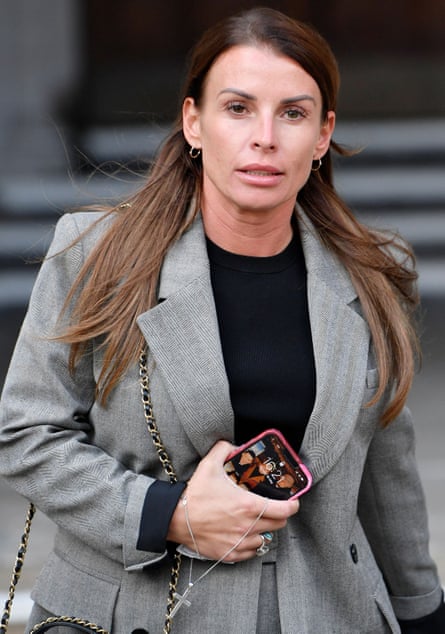A “devastated” Rebekah Vardy has lost her libel case against Coleen Rooney, leaving her facing a bill for millions of pounds in legal costs as she claimed the judge had “got it wrong”.
In a damning high court judgment in the “Wagatha Christie” case on Friday, Vardy was described as an “untrustworthy witness” who was likely to have destroyed potentially crucial evidence on purpose.
Mrs Justice Steyn concluded Vardy probably worked with her agent, Caroline Watt, to leak stories from Rooney’s private Instagram account to the Sun, providing tips to tabloid journalists and aiding them with their inquiries.
Vardy now faces a substantial legal bill, reportedly around £3m, after deciding to pursue the case to trial. She must also deal with a reputation left in tatters after the judge’s 75-page ruling described her evidence as “inconsistent”, “evasive” or “implausible”.
The judge was highly critical of the loss of key communications in the case. She said it was not believable that Watt accidentally dropped her mobile phone in the North Sea shortly after a legal request was made to search its WhatsApp messages.
After the ruling, Vardy pleaded with those who had subjected her to abuse to stop, adding: “As I explained in my evidence, I, my family and even my unborn baby were subjected to disgusting messages and vile abuse following Coleen’s post and these have continued even during the course of the trial.
“The case is over,” she said, adding: “I am extremely sad and disappointed at the decision that the judge has reached. It is not the result that I had expected, nor believe was just. I brought this action to vindicate my reputation and am devastated by the judge’s finding.
“The judge accepted that publication of Coleen’s post was not in the ‘public interest’ and she also rejected her claim that I was the ‘Secret Wag’. But as for the rest of her judgment, she got it wrong and this is something I cannot accept.”
Rooney welcomed her victory but added that she “never believed it should have gone to court”. She said: “It was not a case I ever sought or wanted. I never believed it should have gone to court at such expense in times of hardship for so many people when the money could have been far better spent helping others.
“Both before and after my social media posts in October 2019, I made every effort to avoid the need for such a drawn-out and public court case. All my attempts to do so were knocked back by Mrs Vardy.”
The saga began three years ago when Rooney, the wife of the former England footballer Wayne, conducted a “sting” operation to find out who was leaking stories from her private Instagram account to journalists at the Sun.
Rooney identified the culprit with the now infamous words posted on Instagram: “It’s ……… Rebekah Vardy’s account.”
Vardy, who is married to the Leicester City footballer Jamie, denied passing information to the Sun and sued Rooney for libel in an attempt to restore her reputation.

In her ruling, the judge concluded that “significant parts” of Vardy’s evidence were not credible and there were many occasions when her evidence “was manifestly inconsistent with the contemporaneous documentary evidence, evasive or implausible”.
She also said that Vardy and Watt were likely to have deliberately destroyed potentially damning evidence. WhatsApp messages on Watt’s phone were lost after the device was dropped off the side of a boat in the North Sea, while Vardy’s own copy of the same messages was lost in the process of backing them up.
The judge concluded: “It is likely that Ms Vardy deliberately deleted her WhatsApp chat with Ms Watt, and that Ms Watt deliberately dropped her phone in the sea.”
She also found it was likely Vardy “knew of, condoned and was actively engaged” in the process of Watt leaking stories about Rooney to the Sun.
Although Rooney’s defence succeeded on the matter of truth – after convincing the judge that the claim against Vardy was likely to be true – she failed on her public interest defence.
This was, in part, because Rooney failed to follow standard journalistic practice by going to Vardy for comment before publishing the accusation.
Bringing the case meant Vardy, 40, endured days of difficult cross-examination at the high court. This covered everything from her history of selling kiss ’n’ tell stories to tabloids about the singer Peter Andre, to allegations she had leaked details of her husband’s relationship with his teammates, and her own record of passing information to the Sun.
During the trial, the court heard of personal WhatsApp messages sent by Vardy against Rooney, details about her trying to sell a story about a drink-driving arrest involving footballer Danny Drinkwater to the Sun, and her attempts to shift the blame for the leaks about Rooney on to Watt.
There was widespread mockery in court of the loss of potentially crucial evidence by Vardy and those around her. Rooney’s lawyers invoked a legal precedent from 1722 to argue that, in the absence of evidence, the judge should assume the worst.
The legal team for Rooney, 36, admitted to the court that they did not have any smoking gun proving definitively that Vardy was responsible for the leaks. However, they defended the claim on two grounds: first, that the accusation was true based on circumstantial evidence available to Rooney; and second, that it was in the public interest for Rooney to make the accusation against Vardy.
Vardy’s team had told the court her life had been made hell by Rooney’s public accusation, which left her open to widespread mockery, social media abuse and negative chants when her husband played football.
Her barrister, Hugh Tomlinson, said his client would have had to have been “very clever or very cynical” to have undertaken the manual deletion of WhatsApp messages. He said it would be an “extraordinarily complicated conspiracy” to have deleted all the evidence.
The process of assessing the pair’s legal bills could take a significant amount of time. The costs have been estimated at £3m, with Vardy having to pay the lion’s share.
Jack Ridgway, the chair of the Association of Costs Lawyers, said: “Assuming there is no appeal, the costs process will now begin. As the loser, Mrs Vardy will undoubtedly be required to pay Mrs Rooney’s costs, but these will be subject to a court process called assessment … as a generalisation, winning parties recover about 70% of their costs.”
The case has become a cultural talking point, with several TV projects based around the court case currently in the works. All of them will now be able to finish with the conclusion that, as Rooney originally claimed, “It’s ………. Rebekah Vardy’s account.”









